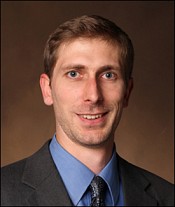Brett Byram, assistant professor of biomedical engineering, has received a National Science Foundation Faculty Early Career Development grant.
The five-year, $549,995 grant – Ultrasound Brain-Computer Interface – begins May 1, 2018.
The award funds the development of a next-generation ultrasound device to enable real-time ultrasonic visualization, without the use of contrast agents, of brain perfusion – cerebral blood flow and pressure – and translate these signatures into action.

“The project leverages my labs competitive advantage in ultrasonic beamforming and image formation, as well as our unique ability to measure changes in perfusion without contrast agents,” Byram said. “The specific focus of this work will lead to a number of broad developments in signal processing and machine learning, which also will support ongoing efforts in radiology focused on ultrasonic visualization of perfusion.”
This work will be a transformational integration of acoustics, machine learning, signal processing, and neuroscience to better understand and access functional and anatomical information, he said.
Using ultrasound imaging to measure and interpret brain activity, Byram will integrate that information with existing electroencephalography (EEG)-based techniques. Doing this will provide faster and more precise measures of brain activity compared to existing techniques. It will also allow for the integration of information about structures deep in the brain – below the cerebral cortex – into brain-computer interfaces. This is information EEG systems cannot provide.
A wearable helmet will capture ultrasound and EEG signals together and a new probe will physically register both. The helmet data will be used to develop independent ultrasound only and integrated (EEG and ultrasound) algorithms for detecting brain states that computer systems can use either as direct commands or as input to adapt their behavior to a user’s current brain state.
“We expect the portable ultrasound helmet prototypes will resolve ultrasound image quality problems, and the new integrated algorithms will lead to new techniques for both understanding brain activity and using it to interact with computers,” Byram said.
Byram’s Biomedical Elasticity and Acoustic Measurement Laboratory (BEAM Lab) was formed in August 2013. The BEAM Lab is part of the Biomedical Engineering Department and affiliated with the Vanderbilt Institute for Surgery and Engineering.
Byram joined the Vanderbilt engineering faculty in 2013 from Duke University where he was an assistant research professor in biomedical engineering. He earned a B.S.in biomedical engineering and math from Vanderbilt in 2004. He received the Ph.D. degree in biomedical engineering in 2011 from Duke.
Contact: Brenda Ellis, (615) 343-6314
brenda.ellis@vanderbilt.edu